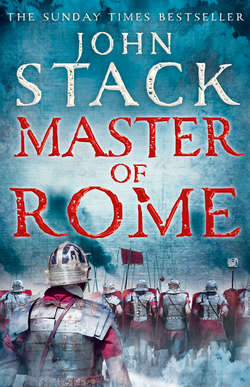Читать книгу Master of Rome - John Stack - Страница 10
CHAPTER FIVE
ОглавлениеAtticus stood on the foredeck of the Orcus as the galley cut a path through the teeming waters of Ostia, his gaze ranging over the entire harbour. The sight never failed to overawe him, the multitude of ships competing for space, the sprawling docks consuming the cargo of each vessel as fast as it could be unloaded, the traders frantically trying to feed the insatiable appetite of the city twelve miles away.
The trading ships came from all corners of the Mediterranean, the origin of many of them easily distinguishable by the type of craft or the men who sailed them, while others were more anonymous, bireme galleys and sailing barges that were common to every port. Despite the war, the traders recognized few boundaries, and some of the ships that were docking in Ostia had sailed from ports in the Carthaginian Empire only days before, bringing untraceable cargoes that were swiftly exchanged for the faithless denarius. The Roman authorities had tried to stem this flow, banning vessels from the closest Carthaginian dominions of Sardinia, Malta and the Baliares, but the lure of profit had impelled the traders to disguise their activities, and the Roman merchants in Ostia were only too ready to aid the clandestine trade, their first loyalty given solely to the market.
The oar-powered vessels in the path of the Orcus gave way to the larger quinquereme, while Gaius manoeuvred neatly around the more unwieldy sailing barges until the Orcus reached the northern end of the port and the military barracks that was the home of the Classis Romanus. As always there were a number of galleys tethered to the docks, but most of them were triremes, smaller ships that were no longer considered worthy of the battle line and were used primarily for coastal patrol in the sea-lanes around Ostia.
Atticus studied the nearest trireme in detail. It was nearly identical to the Aquila, his first command, as were all the triremes in the Roman fleet, mass-produced copies of an original design that had served the coastal fleet for a generation. Atticus saw past the minor differences and smiled as he pictured his old ship, slower and less powerful than the Orcus, but nimbler and quicker to accelerate, an Arabian stallion to the quinquereme warhorse. The Roman fleet’s switch to quinqueremes was unalterable, the changing face of warfare dictating the use of larger galleys, but Atticus still believed that the triremes had strengths disproportionate to their size.
Gaius called for steerage speed and then for the oars to be withdrawn as he steered the Orcus to a free berth. Atticus turned to leave the foredeck but he stopped as he saw a number of men running towards his galley. A mixture of sailors and legionaries, they were clearly agitated. Atticus spotted an officer at the head of the group, his head turning quickly as he swept the Orcus with his gaze.
‘What ship?’ the officer shouted as he neared the dockside.
‘The Orcus,’ Atticus called back.
The officer followed the voice and looked directly at Atticus. ‘What fleet?’ he called frantically.
‘The consul’s fleet, from Africa.’
For a second the officer seemed lost for words, as if Atticus’s identification had somehow confirmed a terrible truth. ‘Is it true?’ he asked.
Atticus looked perplexed.
‘The storm, the fleet,’ the officer continued, his voice rising. ‘Is it true? Has the fleet been destroyed?’
Atticus was stunned by the questions and he moved quickly to the main deck as mooring ropes were thrown and made secure. The officer mirrored his progress on the dock, his impatience increasing, and as the gangway crashed down he was standing directly before Atticus.
‘Answer my questions, Captain,’ he said angrily.
‘Prefect,’ Atticus corrected him as he disembarked. He noticed the officer wore the uniform of a tribune, and so their ranks were in effect the same, although Atticus doubted that the Roman would recognize the equality.
